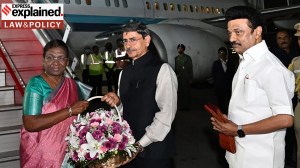Cricket’s trail of shame
Bangalore, April 11: A former Indian skipper related an absolutely amazing tale: His counterpart told him as they walked out to toss to st...

Bangalore, April 11: A former Indian skipper related an absolutely amazing tale: His counterpart told him as they walked out to toss to start a Test, that he would be deemed to have won the toss. Taken aback, the Indian stated he did not want any hanky-panky and they would toss as per convention. The opposing captain smiled grimly and nodded.
Now these were the days when the match referee and television crew did not accompany the captains for the toss. Presently, in front of a full house, the Indian captain tossed the coin, but before he could see how the coin landed, the rival captain quickly picked it up and congratulated the Indian captain for having won the toss!
Yes, cricket’s trail of shame runs long.
Pakistani maverick Sarfaraz Nawaz set the ball rolling in the ’80s when he hurled accusations of match-fixing at Asif Iqbal. The latter shrugged off the charges, questioning Sarfaraz’s mental balance. At that time, it was a novel charge.
Later, one Indian captain was dragged into controversy when he was accused of having declared the side’s total one run short of the opponents in a Test that ran through just one innings.
For a while, controversies like these seemed to be absent. However, the Sharjah tournaments, which many were convinced were rigged and played in front of Mafia dons, promptly brought cricketing controversies to centre stage in the early ’90s. These tales which Jagmohan Dalmiya and IS Bhindra gave wide publicity, virtually propelled them to power in the BCCI.
GLOBALISATION: The ’90s, which witnessed an explosion of cricket telecast and the globalisation of the game also brought fresh allegations involving match-fixing, betting, etc.,. The needle of suspicion swung wildly, but in cricketing circles, only some names were spoken of and then, only in hushed tones.
Around this time, Venkat Rao, manager of the Indian team that toured New Zealand in 1994, created an uproar when on the team’s return, he stated that four of the Indian players were involved in match-fixing. He later denied the statement and said he had been misquoted.
If these allegations were bad, worse was to come.
The collapse of the Pakistani-run BCCI bank was often cited as the reason for a whole lot of Pakistani players allegedly fixing matches. Salim Malik bore the brunt of these charges, though Wasim Akram and a few others were also repeatedly named. Rashid Latif claimed to have proof, but a series of inquiry committees to go into the findings of other inquiry committees only ensured that the whole issue was confusing, manipulative and muddled.
The Pakistanis were all given clean chits, but street talk was of bookies being wary of results involving the Pakistani team.
Amidst these allegations, Outlook magazine did a series of exposes. Manoj Prabhakar and Rashid Latif said just enough to plant doubts on the genuineness of many match results. The BCCI followed the Pakistani example, and before the Parliament and government could react, set up the Justice Chandrachud commission.
The gist of the commission’s findings are only too well known to warrant repetition here. Suffice to state that many, including Prabhakar, felt that the commission only helped sweep the issue under the carpet. Everybody was given a clean chit.
But happenings elsewhere mocked the clean chits given by the Indian and Pakistani commissions of inquiry.
In Sri Lanka, two Australian stalwarts, Mark Waugh and Shane Warne, admitted they had taken money from an Indian bookie to give details on pitch conditions, playing XI, etc.,. The commonly asked question then was: If an Indian bookie had given huge sums to Aussie players, would he not have given similar deals to Indian players for similar details?
Besides, it was felt the Australians were being compromised with classic methods of entrapment. The whole affair was made sordid when the Aussies claimed that they had earlier been approached by Salim Malik, a claim the latter stoutly denied.
In between, a Mumbai police officer told a magazine that he had explosive tapes of telephonic conversations of certain players. Strangely, nobody sought details. During this period, the Indian team was losing everywhere and the common refrain among wags was: Why ever pay this team to lose when they were doing it anyway!
There it stood till the Hansie Cronje tapes. The subsequent confession and sacking are seen as ‘they were doing it anyway!
Photos




- 01
- 02
- 03
- 04
- 05



























